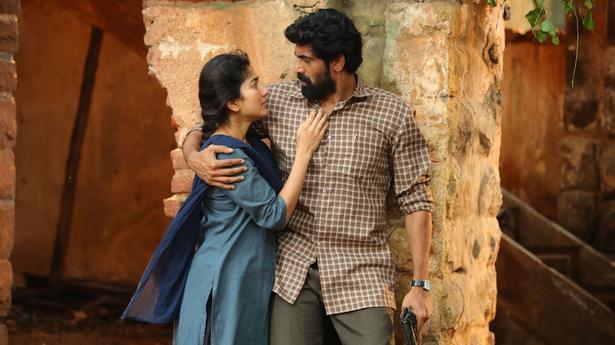
‘Virata Parvam’ movie review: Sai Pallavi shines in this adventurous romance
The Hindu
Venu Udugula attempts a poetic romance saga inspired by true incidents, helped hugely by a talented ensemble cast, music composer and cinematographers
Towards the end of the Telugu film Virata Parvam, the news clippings pertaining to Sarala, who inspired Sai Pallavi’s character Vennela, left me both intrigued and moved. I wondered how much of the last 20 minutes were a factual retelling of events that took place in Warangal in 1992. We may not know the extent of dramatisation for the film, but what lingers is the plight of Vennela whose love knows no reason but is powerful enough to move a few hardened men and women in the jungles to tears. The world that writer-director Venu Udugula presents is far removed from that of the pragmatic modern day romances.
The film’s male protagonist, Ravanna alias Aranya (Rana Daggubati), is a poet. There is poetry in how cinematographers Dani Sanchez-Lopez and Divakar Mani play with light and shade to present Vennela’s journey, with a painting-like quality but never at the cost of romanticising the stark surroundings. Suresh Bobbili’s music is haunting and achingly melodious where necessary. Some of the dialogues, lyrics and situations, too, have a poetic quality to them. Take the reason why Vennela is named so and the dramatic events that unfold during her birth. When Vennela’s voiceover states that a war that consumes many in its wake is the one that birthed her, it rings true.
Venu narrates the journey of the naive yet fiercely stubborn Vennela; the wonderful Sai Pallavi who enacts the part and Rana supporting the vision as an actor and producer make the effort worthwhile.
A childhood incident indicates how stubborn Vennela can be. We may or may not buy that point of view immediately but the scenes thereafter build on it.
When Vennela draws a heart symbol over a sickle painted on a wall or looks lovingly at the sickle shadow on a wall, it gives away how besotted she is becoming with the writings of Ravanna. It befits the film’s tagline – revolution is an act of love.
The film is a throwback to the 1990s and has been shot in widescreen format (1.85:1 aspect ratio) to recreate the look of the decade. Even if you don’t pay attention to such technical details, the film has enough to draw you in.
Sai Pallavi enacts Vennela with a mix of innocence and strength, making us shudder each time she is caught in a tough situation. A part of me wished she would just return home to safety. But Vennela is cut from a different cloth. Some of the characters that surround her are also unconventional. Easwari Rao is convincing as the mother who is worried for her daughter. Sai Chand plays an atypical father, an Oggu Katha artiste who voices what the art form means to him and why he can understand his daughter’s point of view. A small gesture from Rahul Ramakrishna at this point is funny and mirrors the audience reaction.











